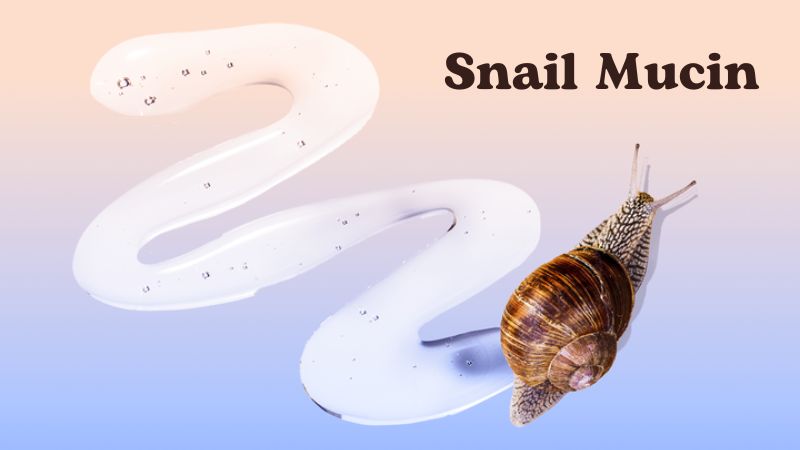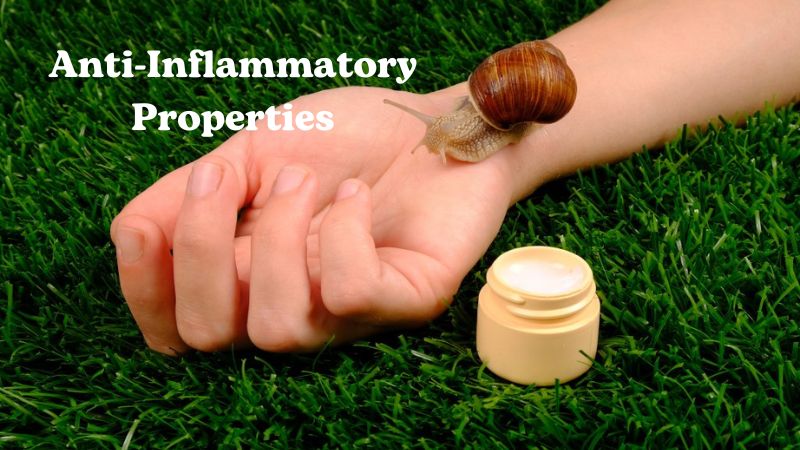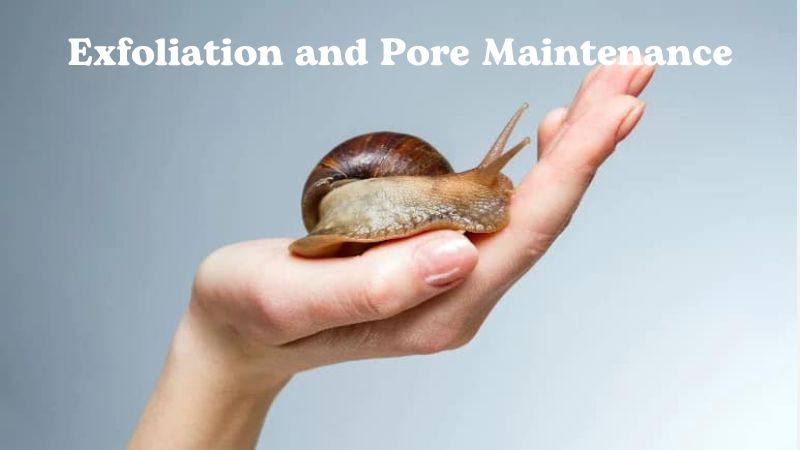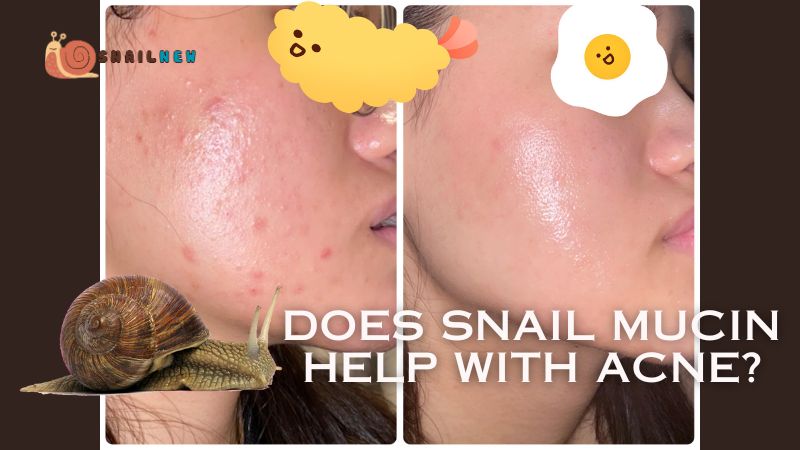The quest for clear, healthy skin has led many to explore various skincare ingredients, one of the most intriguing being snail mucin. Snail mucin, also known as snail secretion filtrate, is a popular ingredient in skincare products, especially within the realm of K-beauty (Korean beauty). But the burning question remains: does snail mucin help with acne? This article from Snailnew delves into the potential benefits of snail mucin for acne-prone skin, exploring its properties, effectiveness, and how to incorporate it into your skincare routine.
Table of Contents
ToggleUnderstanding Snail Mucin
Snail mucin is the slimy secretion produced by snails, which helps them glide smoothly over surfaces and protects their delicate bodies from environmental damage. This secretion is harvested, filtered, and incorporated into various skincare products. Snail mucin is rich in beneficial compounds, including glycoproteins, hyaluronic acid, glycolic acid, and allantoin. These components contribute to its hydrating, anti-inflammatory, and regenerative properties, making it a sought-after ingredient in skincare.

Does Snail Mucin Help With Acne? The Benefits
Hydration: The Foundation of Healthy Skin
One of the key benefits of snail mucin is its ability to hydrate the skin. Hydration is crucial for maintaining a healthy skin barrier, which acts as the first line of defense against external irritants and bacteria. When the skin is well-hydrated, it is better equipped to maintain its barrier function, reducing the likelihood of acne breakouts. But, does snail mucin help with acne directly through hydration alone?
Hydrated skin also tends to be more resilient and less prone to irritation. Snail mucin, being a powerful humectant, draws moisture into the skin and helps retain it. This can be particularly beneficial for individuals with acne-prone skin, as dryness and dehydration can exacerbate acne by prompting the skin to produce excess oil. By keeping the skin hydrated, snail mucin helps balance oil production and prevent clogged pores.
Anti-Inflammatory Properties
Inflammation is a common characteristic of acne, leading to redness, swelling, and discomfort. Snail mucin contains components like glycoproteins and hyaluronic acid, which possess anti-inflammatory properties. These compounds help soothe irritated skin and reduce the redness and swelling associated with acne.

When considering does snail mucin help with acne, it’s important to note that its anti-inflammatory effects can provide significant relief for inflamed acne lesions. Regular use of snail mucin can calm the skin, making it an excellent addition to a skincare routine for those dealing with inflammatory acne.
Healing and Regeneration
Acne can leave behind scars and hyperpigmentation, which can be as distressing as the breakouts themselves. Snail mucin is renowned for its healing and regenerative properties, thanks to its rich content of allantoin and glycolic acid. Allantoin promotes skin cell regeneration and repair, while glycolic acid gently exfoliates the skin, helping to fade acne scars over time.
The regenerative properties of snail mucin extend to improving overall skin texture and tone. By promoting the turnover of skin cells, snail mucin helps reveal fresher, healthier skin. This can lead to a reduction in the appearance of acne scars and a smoother complexion, addressing concerns beyond just active breakouts.
Antimicrobial Effects
Another aspect to consider when asking does snail mucin help with acne is its potential antimicrobial effects. Some studies suggest that snail mucin has antimicrobial properties, which can help combat the bacteria responsible for acne. By reducing the presence of acne-causing bacteria on the skin, snail mucin can help prevent new breakouts from forming.
While snail mucin’s antimicrobial properties are not as potent as those of traditional acne treatments like benzoyl peroxide or salicylic acid, they still offer a natural and gentle alternative for managing acne. This makes snail mucin a suitable option for individuals with sensitive skin who may find conventional acne treatments too harsh.
Exfoliation and Pore Maintenance
Clogged pores are a common cause of acne, and snail mucin’s exfoliating properties can help address this issue. Glycolic acid, a natural component of snail mucin, helps to gently exfoliate the skin, removing dead skin cells and preventing clogged pores. This gentle exfoliation can help keep the skin clear and reduce the frequency of breakouts.

Regular exfoliation is essential for maintaining clear skin, but it’s important to use gentle exfoliants to avoid irritation. Snail mucin provides a mild exfoliating effect, making it suitable for daily use without causing excessive dryness or irritation. This makes it an ideal ingredient for those with acne-prone skin looking to maintain a clear complexion.
How to Incorporate Snail Mucin into Your Skincare Routine
Given its numerous benefits, incorporating snail mucin into your skincare routine can be a game-changer for acne-prone skin. Here are some tips on how to use snail mucin effectively:
- Product Selection: Look for products that list snail mucin high on the ingredient list to ensure you are getting a significant amount. Serums and moisturizers with snail mucin are particularly effective.
- Patch Test: As with any new skincare product, it’s advisable to do a patch test to ensure you do not have an adverse reaction. Apply a small amount to a discreet area and monitor for any signs of irritation.
- Complementary Routine: For best results, incorporate snail mucin into a well-rounded skincare routine that includes cleansing, moisturizing, and sun protection. It can be used alongside other acne treatments like salicylic acid or benzoyl peroxide, but be mindful of potential interactions.
- Consistency: Consistent use is key to seeing results. Incorporate snail mucin into your daily skincare routine and give it time to work its magic.
Personal Experiences and Testimonials
Many users report positive results with snail mucin, sharing their experiences of reduced acne breakouts, improved skin texture, and faded acne scars. Testimonials often highlight how snail mucin has become a staple in their skincare routines, providing gentle yet effective care for their acne-prone skin.
For instance, one user shared, “I struggled with acne for years and tried countless products, but nothing seemed to work. I decided to give snail mucin a try after reading about its benefits, and I’m so glad I did. My skin is clearer, and my acne scars have faded significantly.”
Another user noted, “I have sensitive skin that reacts badly to most acne treatments. Snail mucin has been a game-changer for me. It’s gentle, hydrating, and my breakouts have reduced dramatically.”
Conclusion: Does Snail Mucin Help with Acne?
In conclusion, does snail mucin help with acne? The evidence suggests that it can be a valuable addition to an acne-fighting skincare routine. Its hydrating, anti-inflammatory, healing, and antimicrobial properties address multiple factors that contribute to acne. While it may not be a miracle cure, snail mucin offers a gentle and effective approach to managing acne and improving overall skin health.
If you’re considering adding snail mucin to your skincare regimen, it’s worth giving it a try, especially if you have sensitive skin or have struggled with conventional acne treatments. With consistent use and a complementary skincare routine, you may find that snail mucin helps you achieve the clear, healthy skin you’ve been striving for.


